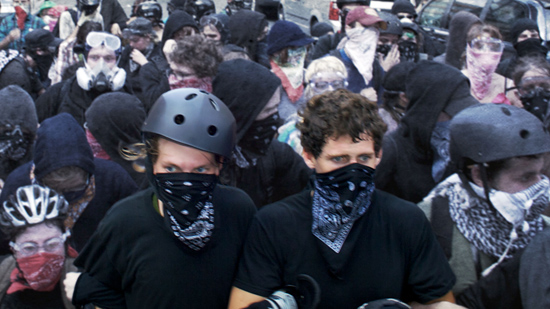
In January 2009, The New York Times ran an article about the controversy surrounding the arrest of two young men from Midland, Texas, for the possession of eight Molotov cocktails at the Republican National Convention in Minneapolis-St. Paul. The story immediately captured our interest. With the government claiming that David McKay, 22, and Bradley Crowder, 23, were domestic terrorists intent on murdering or maiming police and Republican delegates, and the defense asserting that these boyhood friends were victims of a charismatic radical mentor and an overzealous government, what was the real story?
A dozen phone calls and several days later, we were on a plane to Minneapolis to attend McKay's federal trial. (Crowder did what nearly all those facing federal charges do -- he took a plea.) The odds against McKay were long: the federal conviction rate is easily 90%+.
We met David McKay at Sherburne County Jail in Minnesota, hands shackled, the day before his federal trial was to begin. Clean-shaven in a prison-issue bright orange sweatshirt he looked shockingly young and, considering press reports of a black clad radical bent on death and destruction, seemed disarmingly affable and utterly normal. He was also scared shitless -- he was facing up to 30 years in prison.
Walking out of the jail several hours later we had begun to scratch the surface of the case, yet many questions remained. Why, we wondered, did the FBI spend more than six months closely following political naïfs with no criminal history? What led McKay and Crowder to build eight homemade bombs? Did the government save innocent victims from domestic terrorists bent on violence and destruction? Or were the young men impressionable disciples entrapped by the FBI? Or did the answer lie somewhere in between?
While we expected to cover the unfolding legal case, it quickly became clear that a central mystery we needed to unravel was what had happened between McKay, Crowder, and their older radical mentor Brandon Darby from the time they first met at an Austin bookstore in early 2008 up until McKay's and Crowder's arrests at the RNC more than six months later.
We started piecing the back-story together with a range of archival material: intimate jail house phone calls, audio of FBI interrogations, dozens of surveillance photos, video of street battles between protestors and police, and electrifying archival footage of Darby railing against the government in the wake of Hurricane Katrina. We also learned that the Department of Homeland Security had granted $50,000 to the Joint Terrorism Task Force for surveillance cameras at the convention -- and that we could access that footage through the Minneapolis police department. We screened hundreds of hours -- capturing everything from the FBI following our characters as they arrived at the convention to McKay and Crowder shopping for bomb making materials to video from Darby's handheld camera.
We were frequently surprised by the twists and turns the story took. Interviewing FBI agents, attorneys on both sides, defendants, family members, jurors and journalists led to our reevaluating our perspectives several times. Debates between us about personal responsibility versus government accountability -- and about what constitutes entrapment -- regularly erupted in the field and the edit room. We committed early on to building the twists, moral ambiguity and big questions we wrestled with into the film for audiences to experience first hand.
Better This World has already inspired intense discussions in film festivals around the country -- encouraging people to grapple with one of the critical tensions of our time: between civil liberties and security in a post 9/11 world. The film is opening theatrically in New York (Aug 12-18) and Los Angeles (Aug 26-Sept.1) and will broadcast nationally September 6 on POV/PBS. We hope some of you will be able to see it.
Please watch the trailer for the film here.